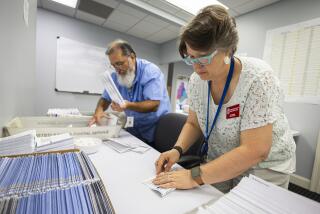Coal mining town torn over its lifeline
Brenda Willis rushed out of the One Stop food shop Tuesday wearing a “Route 3 Spousal Group” T-shirt and carrying an armful of sandwiches and cold drinks.
“For the families of the lost ones,” Willis said as she loaded the food into an SUV for delivery to families gathered at the Upper Big Branch mine office to learn the fates of the missing miners caught in Monday’s explosion.
Like virtually everyone in the string of unincorporated villages that dot Route 3 along the muddy Big Coal River, Willis knew several victims of the worst U.S. coal mine disaster since 1984. The wives of some victims are members of the Route 3 Spousal Group, formed five years ago to help coal families through good times and bad.
The group sprang into action shortly after the mine explosion Monday, consoling family members of miners believed to be trapped inside.
Many politicians and residents in West Virginia’s coal country are sharply critical of the mine’s operator, Massey Energy Co., for its spotty safety record and its nonunion mines. But Willis and fellow spousal group member Sharon Petry, who worked a coal mine shuttle car for five years, have only praise for the area’s biggest employer.
“Everything Massey has done for us over the years has been wonderful,” Willis said. “I don’t have a bad word to say about them.”
When her husband died after retiring from working 33 years as a miner, Willis said, Massey took care of her every need.
Ina Williams, the wife of a Massey miner and the mother of another, said the company flew in a helicopter to airlift her ailing mother during severe flooding in 1997.
“A lot of people criticize the company, but if there’s a disaster, they are there to help,” Williams said.
She spoke inside tiny New Life Assembly church, where her husband Gary Williams is the pastor. Church members were packing boxes of food and drinks for police and firefighters posted along the roadway outside the mine.
A sign outside the church read: “Pray for Our Miners and Families.”
Within a few minutes of the explosion, Ina Williams said, friends began calling her to ask about her husband, who also works at a nearby mine. He was fine, she said, but she quickly realized why they were asking.
“It’s a terrible thing when it finally hits you,” Williams said. “And for these families, it’s only going to get worse.”
Even so, she said, she believed Massey would stand by the families, despite the anger of several family members who said they were not notified by the company of their loved ones’ deaths.
“These families are under a lot of stress, and so of course they want to know right away,” Williams said. “But Massey has always been good to us.”
Other residents approached along the Big Coal River were less charitable. Several complained about what they said were Massey’s domineering ways and thirst for profits, but declined to give their names.
“A lot of people don’t like Massey, but not many of them will tell you that because Massey has taken over this whole river,” said Richard Bradford, 63, who retired after working 30 years for another coal company.
Bradford’s friend, who gave his name only as David, said, “Yeah, people jump all over Massey, but if it wasn’t for coal, not many people would have jobs around here.”
Bradford arrived Tuesday at a small frame house across the Big Coal River from the Upper Big Branch mine to console the family of his longtime friend Deward Scott, 58, who died in the explosion.
Scott rented the little house to be close to work at the mine, where he was just 18 months from retirement, Bradford said. As Bradford spoke, Scott’s son, Daniel Scott, walked into his father’s house, his head bent low.
“It was pretty bad,” Bradford said. “The son was there working the mine. He escaped but his dad didn’t.”
Bradford shrugged. “This kind of tragedy just seems to be part of coal mining,” he said. “And I know this: I’m glad to be out of it.”
Bradford gestured toward the shuttered Upper Big Branch mine, where an American flag flew at half-staff and police blocked access to the main gate.
The big green coal chutes were still and the tall concrete coal silo loomed silently. Somewhere inside the mine office, miners’ families waited to hear the worst.
“I never want to go back into a coal mine -- never,” Bradford said.
david.zucchino@ latimes.com
More to Read
Sign up for Essential California
The most important California stories and recommendations in your inbox every morning.
You may occasionally receive promotional content from the Los Angeles Times.











